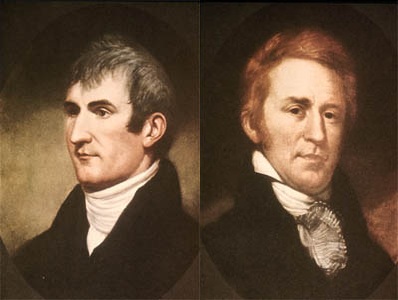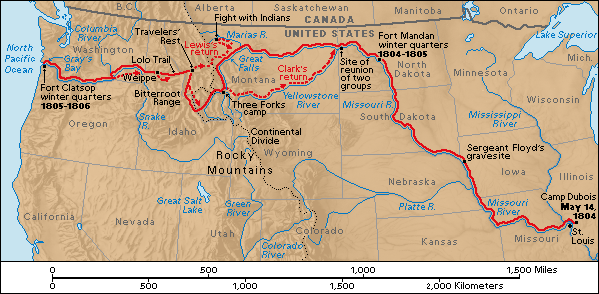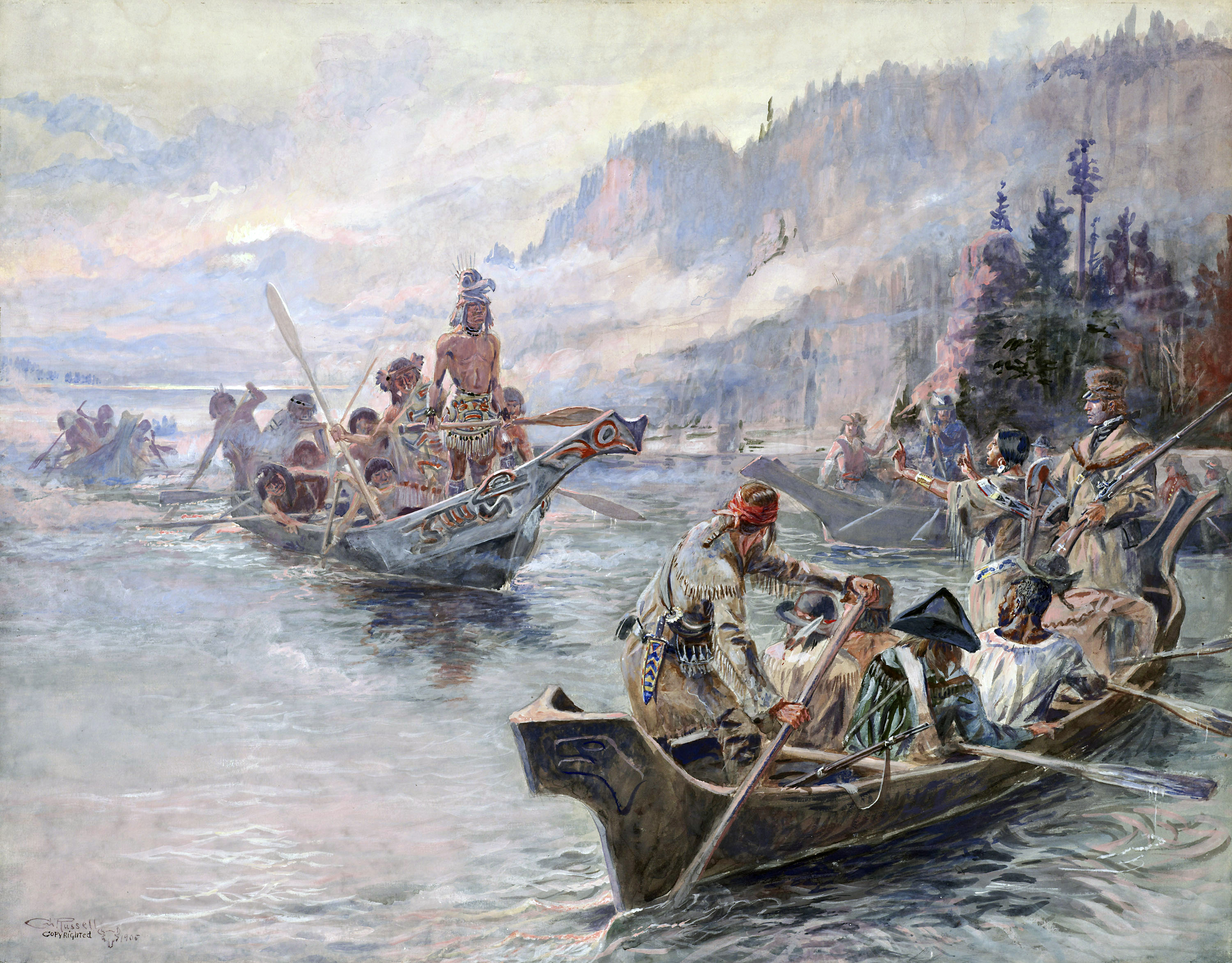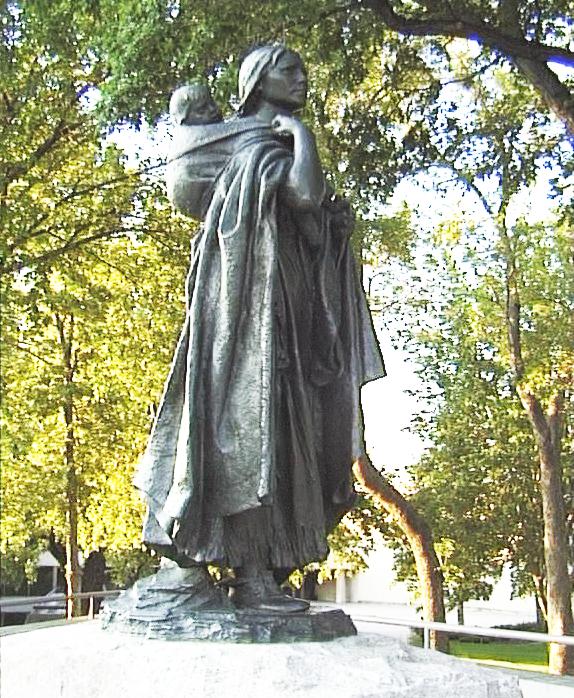Focus Question: What was expedition of Lewis and Clark, what was the role of Sacagawea and how did the expedition affect the future settlement of the American Northwest?
Topics on the Page
Jefferson's Letter to Congress
The Corps of Discovery
The Role of Sacagawea
Native Americans and Lewis and Clark
 Multimedia Resources
Multimedia Resources
- Jefferson's Confidential Letter to Congress,
- In this video transcription, historian Leah Glaser analyzes Jefferson's request for funding for the Lewis & Clark Expedition, with an emphasis on his vision for the future of native people.
The Corps of Discovery
Meriwether Lewis and William Clark

Lewis & Clark Timeline
On February 28, 1803, President Thomas Jefferson won approval from Congress for a visionary project and a grant of twenty-five hundred dollars to fund a small expeditionary group, whose mission was to explore the uncharted West, specifically the newly acquired Louisiana Purchase.
.png) Jefferson issued this statement
Jefferson issued this statement
Washington D.C., June 20, 1803
To Meriwether Lewis Esquire, Captain of the first regiment of Infantry of the United States of America.The Object of your mission is to explore the Missouri river & such principal stream of it as by it's course and communication with the waters of the Pacific ocean, whether the Columbia, Oregon, Colorado or any other river may offer the most direct & practicable water communication across this continent for the purpose of commerce.
In other words, Jefferson hoped the expedition would find a water route to the Pacific Ocean and to establish American presence in the West.
Lewis and Clark came into contact with many Indian peoples that had occupied those regions.
They instituted trading and even developed a ritual that they used when meeting a tribe for the first time. The captains would explain to the tribal leaders that the their land now belonged to the United States, and that a man far in the east – President Thomas Jefferson – was their new “great father.”
They would also give the Indians a peace medal with Jefferson on one side and two hands clasping on the other, as well as some form of presents (often trade goods). Moreover, the Corps members would perform a kind of parade, marching in uniform and shooting their guns.
Lewis and Clark may not have found the elusive Northwest Passage and were not the first to explore the west, but as Robert Archibald states, "they were the first United States citizens to have described the place officially".(1)
The fact that they were a scientific expedition was extremely important, especially during the Age of Enlightenment. The new knowledge they obtained about the Northwest's geography, natural resources, and native inhabitants sparked American interest in the west, and strengthened the nation's claim to the area.
A map of Lewis & Clark's route

 Primary Sources
Primary Sources
Lewis and Clark on the Lower Columbia, Charles Marion Russell, 1905

Journals of the Lewis & Clark Expedition
Lewis & Clark: The Maps of Exploration, 1507 to 1814 from the University of Virginia Library.
 Multimedia
Multimedia
Timeline: The Lewis and Clark Expedition- Timetoast
 Lesson Plans: Teaching With Documents: Lewis and Clark
Lesson Plans: Teaching With Documents: Lewis and Clark
Lewis & Clark Lesson Plans, Grades 6-8
The Role of Sacagawea
The Sacagawea statue by Leonard Crunelle is located in front of the North Dakota State Capitol in Bismarck, ND

Sacajawea: Lewis and Clark enlisted the help of an American Indian woman, Sacajawea, to accompany them on their travels.
She was an immense help to Lewis and Clark by being able to speak to the numerous Indian tribes they encountered. She also could help with general knowledge about the area, including what to eat and how to travel through the difficult terrain.
According to the Writer's Almanac (April 6, 2020), she acted as an interpreter since she could speak half a dozen Indian languages. But she also knew which plants were edible, and she saved the explorers' records when their boat overturned.
When the trip was over, Sacajawea received nothing. Her trapper husband got $500.33 and 320 acres of land. She died on December 22, 1812, of a "putrid fever," according to Clark's records. She was 23.
New Perspectives on the West - PBS
See Sacajawea: Her Story by Her People from the IdahoStatesman.
See also the Sacajawea entry in Influential Women in American History and Sacagawea from Biography.com
Native Americans and Lewis and Clark
During their expedition, Lewis and Clark encountered 50 different Native American tribes. Each time the travelers met a new tribe, they would make a big fanfare and introduce the United States as their new protectors.
See Lewis and Clark: The Native Americans - by PBS
Native Americans and the Lewis and Clark Expedition: Hospitality and Hostility, University of Virginia
Discovering Lewis & Clark, from Learning for Justice
.png) What was the main goal of the Lewis and Clark Expedition?
What was the main goal of the Lewis and Clark Expedition?
a. to negotiate treaties with Native American tribes to allow White settlement
b. to drive the French out the Louisiana Purchase territory
c. to find a water route through to the Pacific Ocean
d. to identify locations for future U.S. army forts
Answer: C. The main goal was to find a water route or Northwest Passage to enable trade and expansion to the Pacific Ocean.
Sources:
(1) Archibald, Robert R. (2003). "The Significance of the National Lewis and Clark Commemoration". Indiana Magazine of History 99: 254-262.
Comments (0)
You don't have permission to comment on this page.